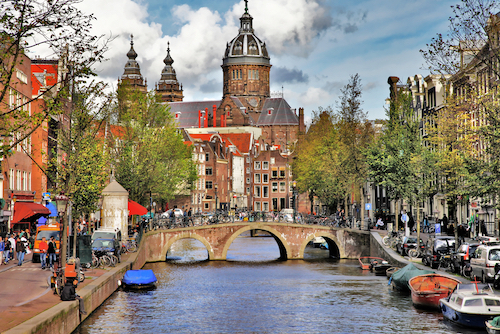In recent times, employers in Amsterdam have started leaning towards offering their employees non-traditional hours, shortened work weeks and remote employment.The Netherlands is considered one of the best countries for a work/life balance and overall quality of life according to the latest surveys. It is also a great place for English-speaking expats to find employment without having a good grasp of the local language.
The number of international companies setting up offices in Amsterdam is increasing, and this, in turn, creates new jobs for English-speaking expats. However, there are several things you need to consider before attempting to get a job in Amsterdam.
Visas
Depending on your nationality, working in the Netherlands may require a residence permit and/or a work permit. These permits are not required to get a job in Amsterdam if you’re from a nation who is a member of the following groups: European Union (EU), European Economic Area (EEA, including Iceland, Liechtenstein, and Norway) or Switzerland. Expats from Croatia are required to obtain a work permit for their first year in the Netherlands.
US citizens can get a single permit issued by the IND which will allow them to work and live in the country. For additional information, including the process and the documentation required, visit the Immigration and Naturalization Service.
Jobs
The Netherlands is quickly becoming known for its tech industry, although it is also a hub for creative industries such as advertising, gaming and fashion as well as research and life sciences.
If you are looking for a specific job then iAmsterdam is a good place to start. You can look for recent vacancies there and find out the average salaries for your chosen profession.
Expatica is another useful site for jobseekers. This website is largely English-focused, so is a great place to start if you’re looking for a position that doesn’t require you to speak Dutch.
Jobs in Amsterdam lists a wide range of open positions across many industries and is geared towards expats.
Networking
While the city is full of expats, you can get a real advantage in the job market if you play the game of ‘it’s not what you know it’s who you know’. The previously mentioned iAmsterdam website has a pretty up-to-date, comprehensive list of job fairs and networking events in the area.
Eventbrite and Eventful have plenty of listings that may be of interest as well. I Am Expat specialises in social and business events for English-speaking migrants.
You can also network in Amsterdam via an online presence. This can be achieved by joining the relevant groups on Facebook or LinkedIn.
Interviews
It sounds pretty basic, but it is important to make a great impression during your interview. While this may not be your first job interview, you do need to keep in mind that there could be some cultural differences in the Netherlands. Bear in mind the following tips.
Dutch people tend to speak clearly and plainly. It pays to be direct and get to the point without beating around the bush. However, don’t be overconfident as this may come across as ignorance.
Don’t be surprised if you seem to have more experience than the person interviewing you. It is pretty common in the Netherlands for people to be in full-time education whilst holding a management position. Dutch people tend to spend on average seven to 17 years on their higher education.
In Amsterdam, having had a lot of jobs isn’t usually an advantage as this can be interpreted as a lack of focus and loyalty.
Know your stuff. As mentioned above, Dutch people hold good education in high regard. Your potential employer will expect you to have done your homework on the company and the vacancy. The more knowledgeable you are about the role, the higher your chances of getting a job offer.
Being on time to an interview seems basic and is important in every country, but in the Netherlands, timeliness is taken very seriously. Being even a minute late will make a bad impression and will likely cost you the job.
The Undutchables has a full list that will help you prepare for a job interview in Amsterdam.
Relocation
So, you arrived on time, kept the conversation on point, showed a great deal of knowledge and received a job offer. Now you will need to think about moving and finding a place to live.
There are lots of sites and agencies specialising in helping expats find rental properties in the city.
Amsterdam Tips has lots of useful hints and tips about the best way to find apartments. The website also has additional information including what you should expect to pay and the best areas in the city to rent or buy.
Once all your ducks are in a row for your move to Amsterdam, it is likely that you will need to convert your money to Euros. You will also need to set up a bank account so you are able to receive your salary. You can go to a bank in person or set up the account online. There are a few banks to choose from, but the four major ones are ABN AMRO (partner in Amsterdam), ING, Rabobank (partner in Amsterdam) and the SNS-bank.
To open a bank account in person, you will need to have the below documents with you:
• Proof of ID (passport or identity card)
• Official proof of address
• Citizen service number (burgerservicenummer, BSN)
• Residence permit (Vreemdelingenpolitie) if applicable
Have you lived in Amsterdam? Share your experiences in the comments below, or answer the questions here to be featured in an interview!

